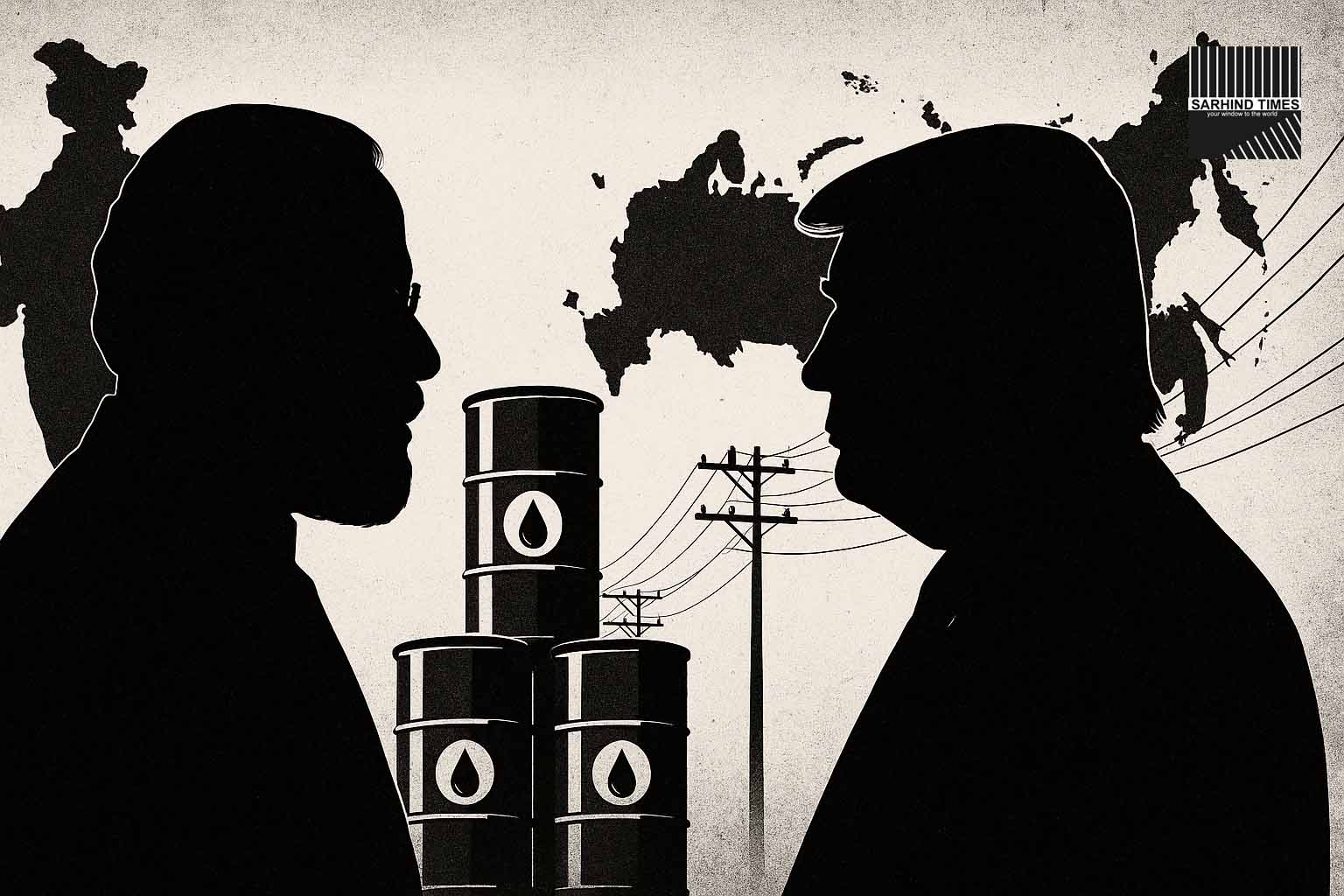In a pointed diplomatic salvo, India’s Ministry of External Affairs dismissed U.S. President Donald Trump’s claim of a conversation with PM Modi over halting Russian oil purchases — underscoring New Delhi’s insistence on strategic independence amid Washington’s pressure.
SarhindTimes Bureau | New Delhi / Washington / Energy Desk
New Delhi, October 17, 2025 — In a move that has escalated tensions between New Delhi and Washington, India’s Ministry of External Affairs (MEA) categorically denied that Prime Minister Narendra Modi held any telephonic discussion with U.S. President Donald Trump on October 15 regarding Russian crude imports. The clarification comes in response to claims by Trump that India had committed to stopping Russian oil purchases — claims swiftly rejected by Indian officials. The episode shines a spotlight on the fraught intersection of geopolitics, energy strategy, and international pressure in an era of sanctions and shifting alliances.
Section I: The Claim and The Counterclaim
Trump’s Assertion
On October 15, in remarks from the White House Oval Office, President Trump told reporters that PM Modi had “assured me today that they will not be buying oil from Russia,” and hailed the purported assurance as “a big step.” According to Trump, India’s decision would not be instantaneous, but he said the change would be phased in “within a short period of time.” He framed this as part of the broader U.S. strategy to deprive Moscow of revenue flows amid the war in Ukraine.
Trump’s remarks came amid mounting friction between the two countries. Earlier, the Trump administration had imposed sweeping tariffs on Indian imports—initially 25 percent, and later an additional 25 percent specifically tied to India’s continuing purchase of Russian oil—bringing the total penalty to 50 percent. Trump has repeatedly tied future U.S.–India trade cooperation to India’s response on Russian energy.
India’s Response — MEA’s Denial
Within hours, India’s MEA, through spokesperson Randhir Jaiswal, rebutted the claim. “As per my information, there was no telephonic conversation between PM Modi and U.S. President Trump yesterday,” he declared in the weekly press briefing. The government clarified that the last official call between the two had occurred on October 9, during which Modi congratulated Trump on progress in the Gaza peace plan and discussed trade.
Jaiswal also reiterated India’s consistent position: that import policies are guided by the objective of safeguarding consumer interests, ensuring supply stability, diversifying sources, and maintaining energy security in volatile global markets.
The MEA further noted that the Indian government does not typically issue realtime confirmations of every interaction, but on this matter, “everything we have to say … has been clearly stated.”
Thus, the official Indian line: Trump’s claim is unfounded; no such commitment or conversation has occurred.
Section II: Strategic Context — Why India Cautioned Against Premature Pledges
Energy Imperative
India is one of the world’s largest energy importers; crude and gas imports account for a significant portion of its trade bill. The volatility of global energy markets—amid sanctions, supply disruptions, and geopolitical risk—underscores the urgency of policy flexibility. New Delhi has repeatedly stated that it must procure oil “where it is affordable and reliable.”
Cutting off Russian imports abruptly would risk supply shocks or steep price premiums elsewhere, which could blunt growth, strain refining margins, and hurt downstream industries and consumers.
Analysts caution that shifting the mix of suppliers rapidly would entail logistical, contractual, and financial challenges.
Strategic Autonomy & Non-Alignment
For decades, Indian foreign policy has prized strategic autonomy: the ability to make independent decisions in its national interest, without being forced into binary alignments. Energy, defense, and diplomacy are core arenas in which India guards this autonomy.
By rejecting the notion of a prior commitment, New Delhi signals that it cannot be boxed into Washington’s geopolitical narratives. Even amid enhanced U.S.–India strategic engagement (e.g., in defense, technology, and security), energy is among the few spaces where India insists on maintaining full discretion.
Pressure from the U.S. & Sanctions Regime
The Trump administration, and more broadly Washington and its allies, have pressed India to reduce Russian oil dependency — arguing that such imports indirectly finance Moscow’s war machine. The U.S. has also deployed economic leverage (tariffs, diplomatic pressure) to influence Indian policy.
Simultaneously, Western nations have been tightening sanctions on Russian oil, including targeting “shadow fleet” tankers and oil intermediaries. London, for instance, recently broadened its sanction regime.
In such a context, any perceived public commitment by India could be leveraged by the U.S. as a diplomatic win — and also used to pressure India further if it fails to deliver.
Diplomacy Under Watch
New Delhi must also juggle its ties with Moscow, its strategic partner, and its own energy investments in Russia (including equity stakes in major oil fields). Abrupt disengagement could jeopardize long-term contracts, investment returns, and diplomatic equities.
Russia has expressed confidence that its energy cooperation with India will continue.
Thus, India’s posture is one of cautious continuity — it may be open to recalibration over time, but only on its terms.
Section III: Repercussions & Reactions
Diplomatic Ripples
The immediate fallout is diplomatic dissonance. Trump’s overreach in stating a conversation that India denies threatens to undermine trust in high-level communiques. It also underscores the precariousness of public diplomacy and presidential rhetoric — when statements are made hastily, they can backfire.
In New Delhi, critics and opposition figures have seized the moment to question the Modi government’s posture. Congress leaders accused the government of being vulnerable to Washington’s pressure
Energy Markets & Refining Margins
In Washington, some analysts may interpret the denials as a challenge; others may view it as New Delhi’s attempt to preserve room for negotiation ahead of upcoming trade or diplomatic meetings.
Even the hint of India reducing Russian crude purchases can send ripples through global oil markets. Traders follow every sign of shifting flows: cuts from India could tighten availability of discounted Russian barrels, pushing up price spreads in Asia. Refiners in India, many of which run on crudes with specific chemistry and logistics, may face mix adjustments.
If Indian refiners shift toward heavier U.S. or Middle Eastern grades, throughput costs, shipping dynamics, and margin structures will shift too.
Trade & Economic Pressure
Trump’s tariff strategy, tied partly to India’s energy policy, remains a sword hanging over trade negotiations. Analysts suggest that India could increase imports of U.S. oil and gas (given surplus U.S. supply), but only if prices and logistics are viable. Indeed, Indian trade officials have floated the possibility of upping U.S. energy purchases from the current ~$12–13 billion level.
At the same time, India must manage the impact of the 50 percent tariff regime on its exports and foreign investment climate — a heavy burden for a growth economy.
Russian Confidence
Moscow, unsurprisingly, expressed confidence that the energy partnership with India would endure. Russian Deputy Prime Minister Alexander Novak affirmed that India remains a long-term partner and that cooperation will continue despite external pressures.
From Russia’s vantage, India is one of the few large, credible buyers with both demand capacity and strategic independence — making the Indian relationship more valuable than ever in a sanctioned environment.
Section IV: What Might Happen Next?
Signals & Meeting Agendas
Watch for possible bilateral meetings — for example, on the sidelines of the upcoming ASEAN summit or quad forums — where the leaders or energy ministers may revisit energy and trade cooperation. The tone and substance of those interactions will be closely read.
Any public declaration by New Delhi regarding future reductions in Russian imports will likely come only after behind-the-scenes negotiations and calibrations. India will avoid unilateral announcements that bind it prematurely.
Marginal Shifts vs Dramatic Cuts
Rather than drastic cuts, India may pursue smaller, incremental reductions or shift procurement toward more neutral suppliers (Middle East, Africa, U.S.) where economically feasible. The emphasis will remain on diversification, contract flexibility, and hedging against supply risk.
Contractual & Logistical Realignments
India might renegotiate contracts and logistics (shipping routes, storage, financing) to enable optionality. Long-term deals could include clauses to adjust supply sources, blending options, or flexibility in volumes. Indian refiners may explore feedstock substitutions or optimization to handle a changing crude slate.
Market Repricing
If Indian demand for discounted Russian crude declines measurably, Asian markets may reprice discounts, tightening margins for all buyers of non-Western crude grades. Secondary markets (trading, swaps) may shift accordingly. India’s refining sector will adjust operations to maintain competitiveness.
Political Pressure at Home
As trade pressures intensify, domestic political discourse may become more charged. Opposition parties may escalate criticism of the government’s handling. The Modi government will need to balance domestic growth, energy security, and international diplomacy — a delicate act in an election climate.
Section V: The Strategic Takeaway
- India draws a firm line: New Delhi refuses to be put in the position of making reactive, headline-grabbing pledges under pressure.
- Autonomy matters: Energy is one of the domains where India preserves maximum flexibility.
- Diplomacy over theatrics: India’s refusal to confirm Trump’s claimed phone call is as much about preserving diplomatic credibility as about factual accuracy.
- Transition is gradual: Any shift away from Russian crude will likely be incremental, calibrated, and cost-sensitive.
- Watch this space: The next few weeks — especially around bilateral meetings and trade negotiations — could reveal whether India tweaks its stance or doubles down on strategic distance.
Closing
In the high-stakes world of energy diplomacy, statements matter. Donald Trump’s claim of a call with PM Modi on Russia oil imports collided with India’s swift denial — a reminder that in foreign policy the messaging matters as much as the moves. As New Delhi navigates increasing pressure from the West, it appears determined to retain space, discretion, and autonomy.
The world will watch closely: whether this is a momentary blip of diplomatic friction, or a turning point in India’s post-Ukraine energy trajectory.
#MEA #RussianOil #IndiaUS #EnergySecurity #Geopolitics #Diplomacy #OilMarkets #StrategicAutonomy #TradeTensions







+ There are no comments
Add yours